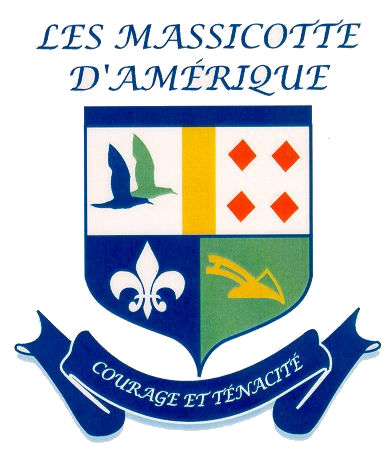
Massicotte in Michigan
Jean Baptiste Massicotte and Josette Labelle came to Michigan and started a family sometime after 1800. The reasons are still unknown. Whether it was due to fur trading, missionary work, military reasons, other job prospects or just to start a new life. I am still researching and any information on this would be greatly appreciated. I believe it was due to the War of 1812. Since British were taking Canada and a "Free" America would sound more inviting, Jean Baptiste probably decided to start a new life and a new family in Michigan.
Jean was born on October 19th, 1782 in Batiscan, Quebec. He was in his early 30's when he started a family in Michigan. Jean and Josette's first son, Dominic was born in Detroit, Michigan on March 15, 1815. This would tell me that they probably migrated to Michigan during or just after the War of 1812.
There is an 1830 census of Wayne County (Outside Detroit) with Jeans name as well as a Land Document from March 20th, 1837 that shows Jean had 80 acres near the Town of Monroe in Berlin Township, near South Rockwood, section 27 (originally Frenchtown Township, then it split up creating Ash Township, Then Ash split up creating Berlin Township).
His son Abraham had 80 acres in Exeter Township, near Carleton, then I found an Abraham with 40 Acres in Berlin Township, Section 27, but a different part of the section than was Jean Baptiste.
Shown on later land maps (1955), all properties were owned by other people. There was also lots owned by Mexicotte's in downtown Monroe on Front Street (and others) in the mid-1800's.
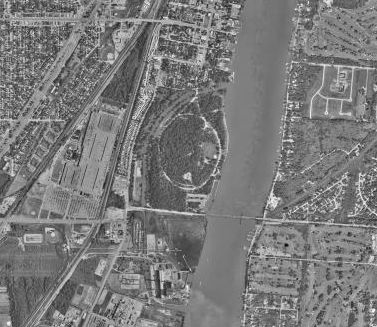
The reason I have dedicated a page for Michigan is because I was born their and am very curious as to why the Massicotte migrated to Michigan from Quebec. The satellite photo above is Trenton, Michigan where I was born. The circular area is Elizabeth Park, which was named after the grand-daughter of the founder of Trenton, Mr. Abraham C. Truax. The land on the right of the Detroit River is the island of Grosse Ile.
The world's first traffic lines appeared in Trenton in 1911, a result of many sideswiping accidents that occurred on narrow bridges that were located on River Road (West Jefferson) just south of town. Trenton's rural postal delivery began in 1906, with Alvin Knight, and door-to-door started in 1925, with Bill Rushlow. The first A & W Root Beer stand in Michigan started in 1935, and today operates on the same site. In 1957, Trenton became a city.
My Grandfather's last name is written as Macicot, but he used Mexico as his last name. There is a story of our last name that was told to me by an Aunt, who was told to her by a Great Aunt:
"The Massicotte's came to Canada, and it translated to Mexicotte in English. The postman was having a hard time keeping the mail straight with all of the Mexicotte's in the same area. So, the family got together and decided that some would use Mexicotte, and some would drop the otte and use Mexico."
That is when my Great-Grandfather decided to be different altogether and use the spelling Macicot.
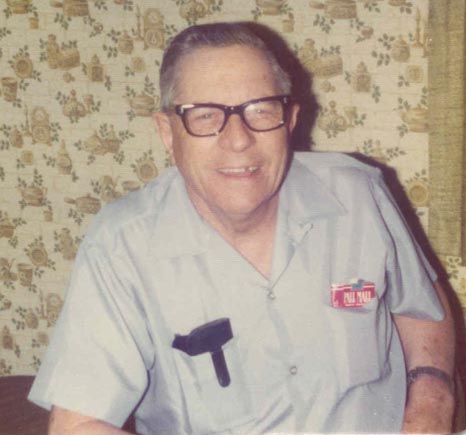 My
Grandfather, Chester, married Florence F. Czajka from Poland in
My
Grandfather, Chester, married Florence F. Czajka from Poland in 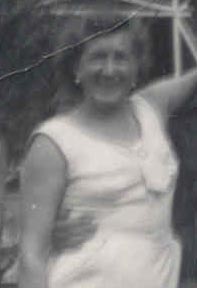 1931.
She came to the U.S. on a ship in 1921 when she was 9 years old along with
her mother Sophia Yoniuk and the rest of the family. Her step-dad's name was
Broski. Eventually they came to Michigan, probably up the Erie Canal.
1931.
She came to the U.S. on a ship in 1921 when she was 9 years old along with
her mother Sophia Yoniuk and the rest of the family. Her step-dad's name was
Broski. Eventually they came to Michigan, probably up the Erie Canal.
My Grandmother died of cancer in 1962 before I was born. The Grandmother I knew was named Eva. She is buried in another cemetery with the Jacksons. Jackson was from her previous marriage. The headstone reads Eva Macicot.
My grandparents are buried in Michigan Memorial Cemetery. My Great-Grandmother is buried their as well. My Great-Grandfather, Great-Great-Grandfather and Great-Great Grandmother are buried in Mt. Carmel Cemetery in Wyandotte, MI.
They lived in Wyandotte before they died. My Great-Grandparents had a house in Wyandotte near Bishop Park by the river. I have photo's sent to me by Mabel Reetz that show my Great-Great Grandparents on a farm in the early 1900's. It is assumed to be on the acreage from the Land handed down by Jean Baptiste near South Rockwood. The farm was probably sold sometime after my Great-Great Grandfather passed away in 1919, and the family moved to the Wyandotte/Trenton area.
When I was little, I used to live on Dickinson Street in Trenton. It is an area of two streets near the railroad tracks called Cork Town. This was its nickname due to a wine distillery that had been there. It was also called French Town due to the many French families. I am told that I was related to many if not all of the families on both streets.
Below are a few links for now on Michigan information. I will be updating this page soon.

French Canadian Society of
Michigan
JANUARY 22, 1813. A British force of 1,300 soldiers and Indians falls upon an American army at the River Raisin near present-day Monroe. Against direct orders, U.S. Brigadier General James Winchester has moved his force of 700 Kentuckians and 200 regulars to the River Raisin. There they are encamped in a poor defensive position. Their leaders have not investigated reports of an imminent British attack. The Americans repulse several British assaults, but finally they surrender because Winchester fears a possible Indian massacre. The British withdraw after the battle leaving behind eighty wounded Americans. The following day, the Indians murder many of these soldiers. The Battle of the River Raisin--the largest battle ever fought on Michigan soil--concludes a series of U.S. setbacks in Michigan during the early months of the War of 1812. Earlier, in mid-1812, Michigan Territorial Governor William Hull, who commanded U.S. forces in Michigan, had invaded Canada prematurely, then retreated and surrendered Detroit after only token resistance. About the same time, the U.S. garrison at Fort Mackinac was taken by surprise and surrendered without firing a shot. In September 1813, U.S. forces will return to Michigan and, amidst cries of "Remember the River Raisin," they will drive the British from Michigan soil. Michigan will grow slowly after the war, but the opening of the Erie Canal in 1825 will precipitate a flood of immigrants, especially from New York and New England.
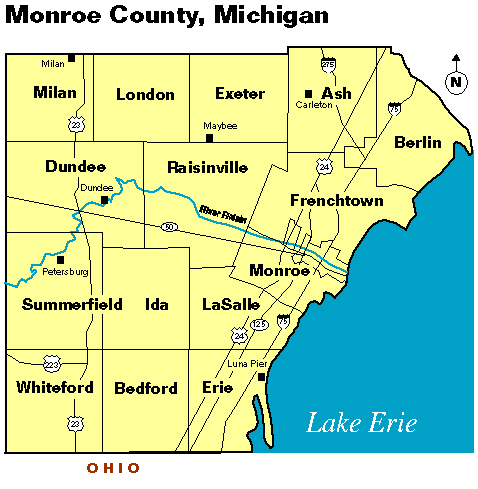
Monroe,
Michigan - Frenchtown Township
T he French settled here in 1780-1795 in long, narrow farms along the River
Raisin and Swan Creek. The Americans wrested the territory from the British
in 1796 as part of Wayne County, its status until 1805. When reorganized again
in 1827, the Township extended from the Huron River to the Raisin River, from
Lake Erie to Raisinville Twp. Later Ash Twp., the City of Monroe and Berlin
Twp. were created from it. The present boundaries were established in 1867.
The previous Townhall, built in 1910, is now the adjacent library branch.
This new townhall was dedicated in December 1973. (Monroe
History)
River
Raisin Massacre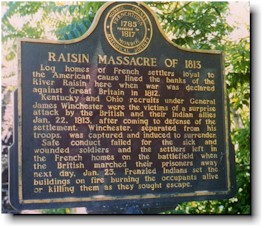
Log homes of French settlers loyal to the American cause lined the banks of
the River Raisin here when war was declared against Great Britain in 1812.
Kentucky and Ohio recruits under General James Winchester were the victims
of a surprise attack by the British and their Indian allies January 22, 1813,
after coming to defense of the settlement. Winchester, separated from his
troops, was captured and induced to surrender. State conduct failed for the
sick and wounded soldiers and the settlers left in the French homes on the
battlefield when the British marched their prisoners away the next day, January
23. Frenzied Indians set the buildings on fire burning the occupants alive
or killing them as they sought escape. (Monroe
History)
River
Raisin
"Remember the River Raisin" became a national battle cry in the War of 1812
after settlers and Kentucky soldiers were massacred by Indians on the river's
banks in violation of protection promised by the British. The stream here
was the center of a sturdy French-American settlement which took form 1760-86.
In the period of controversy after the War of Independence and until 1794
British-Canadian authorities sought to establish the River Raisin as the international
boundary and thus to retain possession of Michigan and control of the Great
Lakes. Indians called the stream "Numasepp," or River of Sturgeon. French
settlers changed the name to "Riviere aux Raisins" which means river of grapes.
Early records tell of great masses of wild grapes which festooned the trees
along its banks. (Monroe
History)

Last
Updated
April 25th, 2004